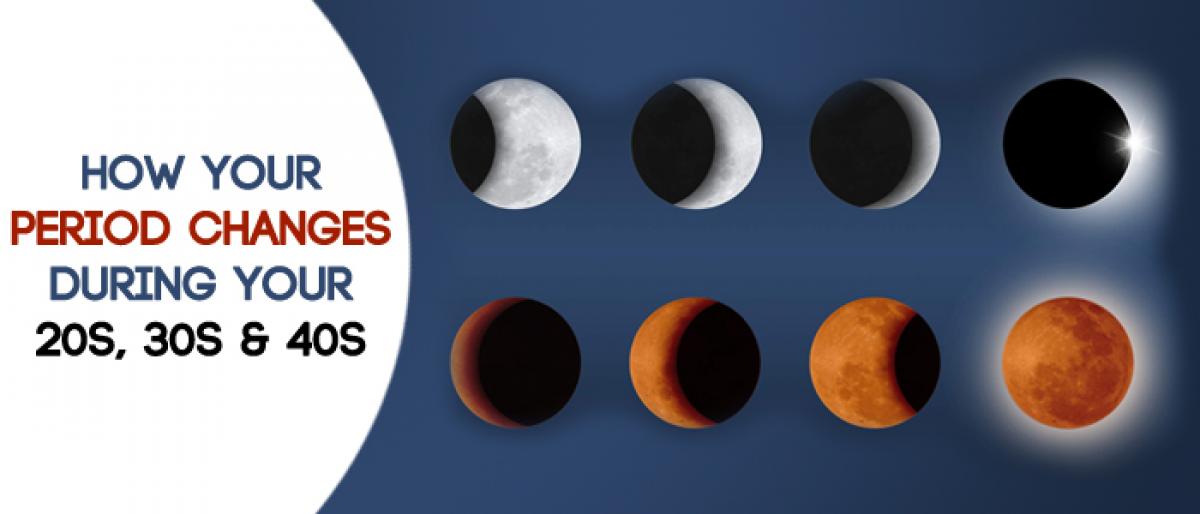How Your Period Changes During Your 20s, 30s, and 40s

Were just taking a guess here, but your period is probably not your favorite monthly eventespecially when it gets all weird on you One month its late, the next its early youre used to a flow lasting four days, then all of a sudden it sticks around for a full week
From easier cramps to a heavier flow to more PMS mood swings, here's a guide on what to expect decade by decade—and when a change to your cycle might be a sign of something serious.
We're just taking a guess here, but your period is probably not your favorite monthly event—especially when it gets all weird on you. One month it's late, the next it's early; you're used to a flow lasting four days, then all of a sudden it sticks around for a full week.
Cramps sideline you when you're caught without pain meds, but once you're stocked up on ibuprofen, you don't feel a twinge of discomfort.
Changes to your menstrual cycle like these are hard to predict and a major pain to deal with. But all we can say is, get used to them. Because as you get older, your period will keep adjusting and evolving, thanks in part to normal age-related hormonal changes as well as experiences such as pregnancy and perimenopause.
Here, a better idea of what to expect in the years to come (as well as what might be a sign that something isn't right).
In your 20's
If you spent most of your teen years struggling with an evil period (you know, the no-show kind that then made surprise appearances at the worst times), we’ve got great news: at this point in your life, your flow will likely become more consistent.
Why? It’s very typical for young girls not to ovulate regularly, says Lauren Streicher, MD, a Chicago-based ob-gyn and author of Sex Rx-Hormones, Health, and Your Best Sex Ever. And without on the regular ovulation, your periods will be more erratic.
On the other hand, when your cycle evens out and comes more or less monthly, you'll also start experiencing PMS, cramps, and breast tenderness. If you weren't used to dealing with these side effects every month, it can be something of an unpleasant surprise.
Another major menstruation change that tends to happen in your 20s has to do with going on birth control. This is the decade many women decide to start taking hormonal contraception—they have a steady partner now, for example, and they're too busy navigating their careers to think about kids.
Going on the pill will likely trigger changes to your usual flow. Think: lighter and more regular periods, less cramping, and reduced PMS symptoms.
In fact, the pill (or another form of hormonal contraception, like the hormonal IUD or Depo-Provera, the birth control shot) can even cause your periods to disappear. Birth control pills prevent ovulation, and without ovulation, there's no uterine lining buildup that has to be shed. Voila! No flow.
In your 30's
For the most part, menstruation should be pretty predictable and consistent in this decade, says Dr. Streicher. Symptoms such as a suddenly heavier flow or more intense pain than your usual cramps may be a sign of a bigger issue.
Benign growths called fibroids, which can leave you with heavier bleeding, generally don't make a debut until you've reached the big 3-0, for example. And endometriosis, which is often marked by crazy-bad pain that might last all month, is also frequently diagnosed when a woman is in her 30s.
Another game-changer that may arise in your 30s? Having babies. You know that getting pregnant means your flow goes MIA. But you may not have realized that your period doesn’t usually come back until six weeks after delivery if you’re not breastfeeding, says Sheryl Ross, MD, an ob-gyn in Santa Monica, California and author of She-ology: The Definitive Guide to Women’s Intimate Health. Period. "And if you decide to breastfeed, your period will not return until you stop or reduce the amount of times you're nursing.”
What’s more, delivering a kid may lead to long-term shifts to your cycle. “Many women will tell you that after they’ve gone through pregnancy, their cramps get better,” says Dr. Streicher. ““That can be caused by a number of things, but since the cervical opening becomes a little bigger the flow comes out without requiring as strong uterine contractions.”
In your 40's
Here’s where the real fun starts. Your 40s mark the beginning of perimenopausal hormonal fluctuations, which are precursors to menopause. During this time, generally the eight to 10 years before menopause (which typically happens in your early 50s), your body preps for the the menstruation finish line.
Normal hormone changes cause ovulation to be more irregular, and estrogen level fluctuation means you could start experiencing missed periods, a heavier flow, spotting between periods, and longer stretches of PMS.
“The thing I always say about perimenopause symptoms is the one thing that’s predictable is that nothing is predictable,” says Dr. Streicher. Just don't forget, even if ovulation is erratic, you can still get pregnant. A woman isn't in menopause until her periods have ceased for at least a year.
Whatever your age, remember that your period offers a lot of insight into overall health. So if you experience any unusual symptoms, it's a good idea to check in with your doctor, says Dr. Ross. Highly irregular periods or drastic changes to your flow may be a sign of thyroid issues, polycystic ovarian syndrome, or a number of other (treatable) health concerns.















